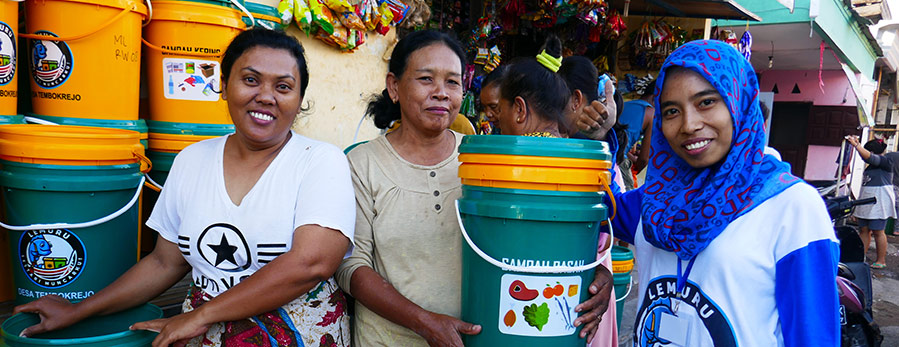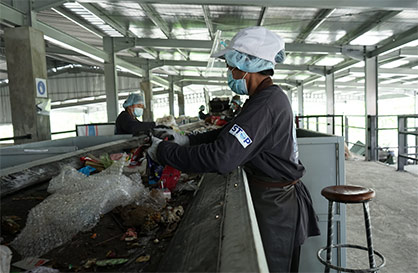#Recycling / Circular Economy
In the fight against ocean plastic, project STOP shows positive 2020 impact in circular waste management in Indonesia

More than 133,500 people reached with sustainable waste management services in three coastal cities
Once at full scale by end of 2022, Project STOP’s three current city partnerships will reach 450,000 people and permanently keep 45,400 tonnes of waste out of the environment, including 5,700 tonnes of plastic through more circular, economically sustainable waste management.
Co-founded by Borealis and SYSTEMIQ in 2017, Project STOP works hand-in-hand with city governments to create effective circular waste management systems in high-need areas of Southeast Asia. Project STOP supports cities with technical expertise to create circular waste management systems that achieve zero-leakage of waste, increase recycling, are economically sustainable, create new jobs and reduce the harmful impact of mismanaged waste on public health, tourism and fisheries. Today, Project STOP operates in three city partnerships, including the coastal cities of Muncar and Pasuruan in East Java, and Jembrana, on the northwest coast of Bali.
By the end of 2020, Project STOP had achieved several important milestones, including:
• Brought waste collection to more than 133,500 people, most for the first time.
• Stopped 8,123 tonnes of waste (1,118 tonnes plastic) from polluting the environment.
• Created stable jobs for 168 waste-workers, which will grow to more than 250 by the end of the programme.
• Completed the construction of five material recovery facilities – one 50 tonnes/day facility in Jembrana, Bali, two 30 tonnes/day facilities in Pasuruan, East Java and two 20 tonnes/day facilities in Muncar, East Java, bringing the total processing capacity to 150 tonnes/day.
• Piloted multiple governance models to support more stable, professional waste management systems.
• Developed an extensive curriculum to train government and others to set up and operate waste systems.
Like many other organisations coping with the COVID-19 pandemic, Project STOP faced challenges ensuring continuous waste management services for the communities where it operates. Waste management services are essential for community health, as well as keeping plastic out of the environment. Since the start of the pandemic in Indonesia, Project STOP conducts rapid testing, hygiene and COVID-19 training, installed and maintains additional hand-washing stations, and takes worker temperatures daily. Workers continue to wear protective equipment, including gloves and face masks, and practice social distancing. Collection vehicles and equipment are fully sanitised daily, with common surfaces cleaned multiple times per day.
“Despite the challenges caused by COVID-19, 2020 was another highly successful year for Project STOP,” says Borealis CEO Alfred Stern. “We are grateful to all of the project’s frontline workers for keeping these essential services going during the pandemic. The initiative continues to deliver the benefits we expected and its achievements to date show how well the organisation is set up, the dedication of its team and the significance of these services to the people who receive them.”
"The success achieved is a result of so many inspiring, committed people from local and national governments, community groups, and our strategic partners productively working together to build circular, zero-leakage waste systems. It's truly a team effort," says Joi Danielson, SYSTEMIQ Partner. “We are looking forward to supporting an increasing number of cities to build modern waste systems and stopping thousands more tonnes of environmental pollution in the years ahead.” ?With an annual consumption of more than 6 million metric tonnes of plastic, it is estimated that Indonesia’s ocean leakage is roughly 1 million tonnes per year, the second largest in the world.
In response, the Indonesian government has created a Marine Debris Action Plan in 2017 committing itself to reduce the country’s ocean plastic flows by 70% by 2025. To contribute to this national commitment, Project STOP plans to further scale its activities across a wider region of Indonesia. A scale-up plan is currently being developed and will be implemented once agreed with the local authorities.
In addition to Borealis and SYSTEMIQ, Project STOP is grateful to its strategic partners who also provide technical expertise. They include the Norwegian Ministry of Foreign Affairs, NOVA Chemicals, Nestlé, the Alliance to End Plastic Waste, Borouge and Siegwerk. The initiative’s supporting and technical partners are Veolia, Sustainable Waste Indonesia, Schwarz and HP. ?This work is made possible by and led in full support with national and local government agencies, including the Ministry of Environment and Forestry, the Coordinating Ministry for Maritime Affairs, the Ministry of National Development Planning/National Development Planning Agency, the Ministry of Public Works and Public Housing, the Banyuwangi Government, the Pasuruan Government and the Jembrana Government, including the environmental agencies of Muncar, Pasuruan and Jembrana.

















